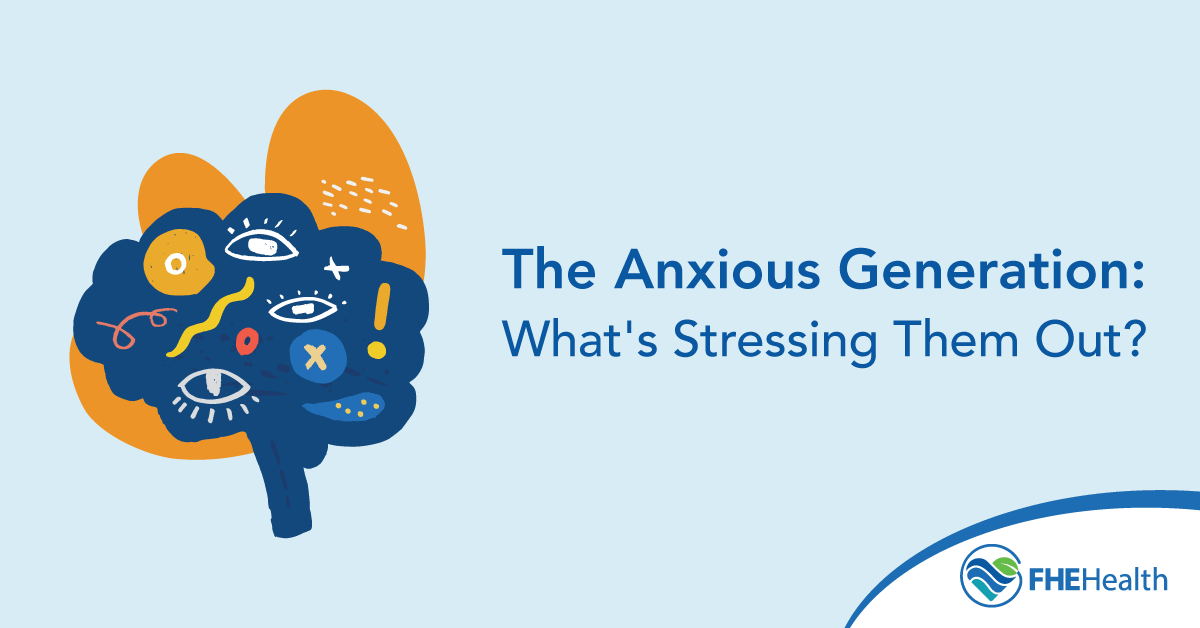
The term anxious generation refers to students and young people born after 1995, especially those born from early 2010 to the present. Changes in technology, potential money problems, and school stress have put pressure on this age group. According to data, approximately 60% of all high school students in the United States feel stress daily. More than 90% of college-aged students feel overwhelmed with their studies. Understanding the root cause is the first step in remedying the problem. This article explores the main factors affecting today’s youth and how social media plays a part. It also introduces coping strategies and how communities can support their young people.
Key Stress Factors Affecting Today’s Anxious Generation
Stress is a normal part of life for everyone, including teens. However, if you’ve noticed your young adult withdrawing or have seen a recent negative change in behavior, they may be overwhelmed and trying to handle too much at once. The more you learn about stress in the anxious generation, the better prepared you’ll be to help. The following are just some things that plague today’s young people.
- School. School can be stressful for teens for many reasons, including demanding schedules, pressure to make teams and perform well in extracurricular activities, and the demands of an after-school job. Pay close attention if you feel your teen has taken on more than they can handle. Having too much to do and feeling overwhelmed can be a stressor at any age.
- Friends. Friends can help increase happiness, provide support during stressful times, reduce loneliness, and enrich a person’s life. Unfortunately, teenagers also deal with bullying and peer pressure, which can affect self-esteem and increase anxiety.
- Family dynamics. Not everyone comes from a happy home, and even the happiest of homes can experience setbacks and problems. Children who receive unconditional love and the emotional support they need from parents and siblings tend to do better in school and usually handle stress in more positive ways.
- World events. Events happening around the world can have a lasting impact on youth. Whether strife in another country or the threat of violence against others, world events can impact an individual’s emotional well-being.
- Life events. Life events, such as changing schools or the loss of a loved one, have the potential to increase the likelihood of anxiety, depression, and substance abuse.
Social Media, Academic Pressure, and Economic Anxiety
Social media has changed how most people communicate and stay in touch, which can be a good thing. However, it also exposes teenagers to unrealistic portrayals of life, beauty, relationships and success. Teenagers who spend large amounts of time on social media sites tend to have lower self-esteem and an increased chance of anxiety and depression.
Johnathan Haidt, a well-known psychologist and author, mentions this issue in his book “The Coddling of the American Mind.” He points out that teens often use social media in place of human interactions, which can lead to loneliness. For many young people, social media exposure creates an illusion of perfection, making teens feel they’ll never be good enough.
Children are often taught at a young age that they must get good grades and go to a good college to succeed. As a result, students are expected to excel on tests and maintain a high GPA. Pulling all-night study sessions and worrying about upcoming exams can result in burnout.
The global pandemic brought economic uncertainty to all ages. Since then, financial worries have affected teenagers who think ahead. Worrying about student debt, getting an apartment and eventually buying a home adds an extra layer of stress.
Impact on Mental Health and Coping Strategies
Stress can have a huge effect on mental health in teens. The anxious generation faces higher rates of anxiety and depression. They also experience sleep problems, an inability to cope and higher rates of health issues. Other signs of struggle in mental health in teens may include:
- Aches and pains
- Increased irritability
- Neglecting chores
- Difficulty concentrating
Coping strategies include tips on dealing with stress at school, at home, and in social situations. The following are a few methods teens can use to reduce anxiety and overcome tough times.
- Deep breathing. Breathing strategies can help calm the fight-or-flight response and manage any situation. Sit comfortably with your feet on the floor. Breathe in slowly through the nose for a count of five, then breathe out slowly through the mouth. Repeat this method for several minutes until you start feeling your body relax.
- Limit social media use. As a parent, it’s important to set boundaries on social media and internet usage. This can be difficult for teens with their own phones and constant access. Encourage regular breaks, and remind your teen that online images usually don’t reflect reality.
- Practice mindfulness. Mindful meditation allows teens to analyze their emotions from a distance. Yoga also stimulates the vagus nerve, which helps slow breathing and initiates a calming response.
- Exercise. Regular exercise releases endorphins in the body, which can make you feel happier and relieve stress. Physical exercise can also increase confidence.
- Sleep. Teenagers aged 13 to 18 need 8 to 10 hours of sleep each night. Help your teen establish a bedtime routine by turning off electronics an hour before bed and limiting light exposure and caffeine. Sleep deprivation can make it much harder to cope with stressful situations.
How Communities and Families Can Support Young People
Communities and families can support young people in stressful situations through educational materials and resources. This includes educating individuals on coping mechanisms, promoting balance with school and home life, and providing access to professional help.
If you have a teen who’s under a lot of stress and needs help, contact FHE Health to learn about our treatment options. Together, we can help set the anxious generation on a path to mental well-being.






